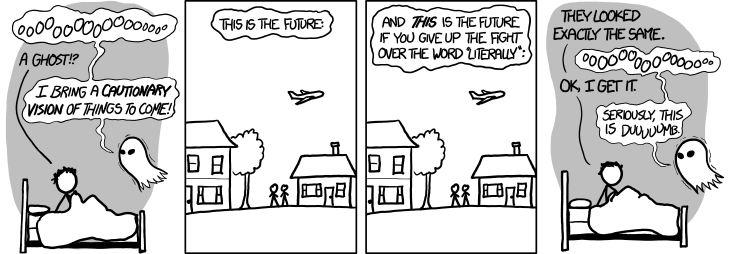Cautionary Ghost

But then the Ghost of Subjunctive Past showed up and told me to stay strong on 'if it were'.

But then the Ghost of Subjunctive Past showed up and told me to stay strong on 'if it were'.
This comic is a parody of Charles Dickens's A Christmas Carol, where Scrooge is replaced with someone who insists on calling people out on their incorrect usage of the word "literally", and speaks to the irrelevance of correcting people's speech.
In "A Christmas Carol", the ghosts of Christmas past, present, and future awaken the main character in the middle of the night to show him the negative causes and effects of his selfish and uncharitable behavior. In this comic the ghost wakes up a man who is intent on correcting people's usage of the word "literally." People often use "literally" as emphasis or exaggeration to a figurative statement, when the word's original meaning was that something had happened exactly as described. A statement such as "I literally ate 40 lbs of chocolate" might be said, when the person might have only actually eaten half a pound. A more correct statement would be "I ate a large amount of chocolate."
The ghost shows the protagonist two futures, one where he keeps correcting people, and one where he stops. That the two "different" futures are exactly (i.e., literally) the same suggests that the man's struggle to get people to stop using "literally" incorrectly will have no meaningful effect on the world, and so the man (and by extension, everyone else) may as well stop wasting time and energy on it.
Ironically, the title text indicates that a second apparition encouraged the man to continue the fight on a different grammatical issue, the use of the phrase "if it were," which is frequently incorrectly substituted with "if it was." "Were" is correctly used in a hypothetical condition, when referencing something that may not be true. The ghost of subjunctive past references the ghost of Christmas past and the 'Subjunctive past tense'. The following sentences illustrate the correct usages:
- If I were rich, I wouldn't have to work for a living.
- When I was rich, I didn't have to work for a living.
Another xkcd comic, 725: Literally, also refers to the overly mocked usage of "literally."
A similar ghost is seen in 1393: Timeghost, where it reminds Cueball about the passing of time, and 2836: A Halloween Carol similarly parodies Dickens's A Christmas Carol.
Popular Culture
The comics Cyanide & Happiness and The Oatmeal offer examples of this sort of derision.